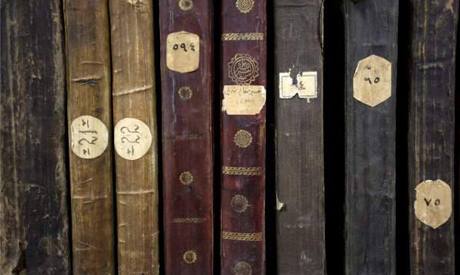
Old books are seen on a shelf in Gazi Husrev-bey library in Sarajevo
When Bosnia's National Library went up in flames in 1992 in a bombardment during the Bosnian Serb siege of Sarajevo, Mustafa Jahic knew he had to act to save his own institution's priceless collection.
As curator of the almost 500-year-old Gazi Husrev Bey Library, Jahic was guardian of a treasure trove of Oriental literature in the heart of Sarajevo, a city under siege during Bosnia's 1992-95 war.
The fruit of his and others' efforts will be rewarded next week when a new state-of-the-art library, a stone's throw from the original in the cobbled streets of Sarajevo's historic Bascarsija district, opens its doors.
"A unique book that is destroyed can never be restored again," Jahic, 60, told Reuters.
"So for me to save a single book became tantamount to saving a human life. It steered me through the war."
Some 3 million books perished when the National Library and Sarajevo's Institute for Oriental Studies were razed in a bombardment by Bosnian Serb forces.
Fearing for his own library's 100,000 volumes, Jahic and a small team of fellow book lovers braved sniper fire to smuggle them in banana crates from one safe house to another.
The most precious were placed in the vault of the central bank. On equipment brought in through a tunnel beneath the city airport, Jahic microfilmed scores of Arabic, Persian, Turkish and Bosnian scripts - priceless testimony to the rich and turbulent history of the Balkans.
Two decades later, the works are together again. Funded by a $9 million donation by the government of Qatar, the library holds 25,000 manuscripts from across the Islamic world.
ETHNIC DIVISIONS
Many, displayed under glass, are considered masterpieces of calligraphy; others were printed on the first Islamic printing press in Istanbul, seat of the Ottoman Empire of which Bosnia was a part for four centuries.
The oldest manuscript - The Revival of Islamic Sciences by Al-Ghazali, a Muslim theologian, philosopher and mystic of Persian descent - dates from 1106.
The library also holds a vast archive of periodicals and the oldest Bosnian newspapers, wills and testaments and records of the old Sharia Court in Sarajevo. The original library premises, in the old town's Islamic school, survived the war but were deemed too small to continue housing the works.
There are plans for a website to provide access to a digitalised collection of manuscripts.
The library's opening marks a rare step forward for Bosnia's cultural life, which since the war has been caught up in the ethnic politicking that has slowed the country's recovery and development.
Bosnia's Serbs, Croats and Muslims were pitted against each other in the war and are still often divided on issues of national identity, culture and history. In late 2012, a row over funding closed the doors of the 124-year-old National Museum, which had survived the conflict.
Jahic's library is named after its founder, Gazi Husrev Bey, who became Ottoman governor of Bosnia in 1521 and is regarded as the greatest builder of Sarajevo.
Standing on the terrace of the new premises, looking out over the church towers and minarets that share the Sarajevo skyline, Jahic said he felt proud and fulfilled.
"Books are our past, our roots," he told Reuters. "Without the past, we have no present or future
Short link: